Sales Commission Agreement Templates
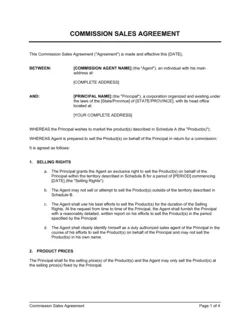
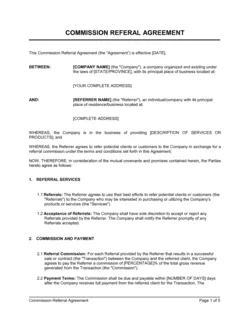
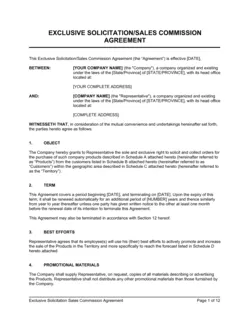
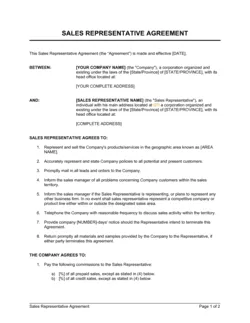
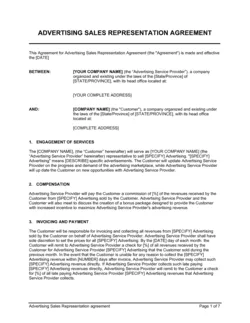
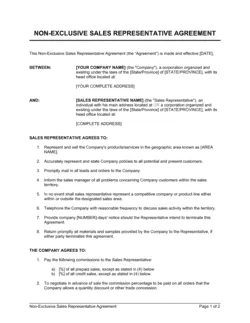
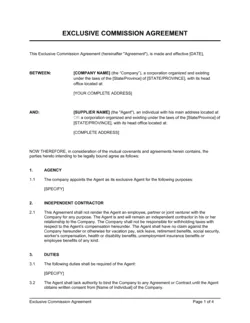
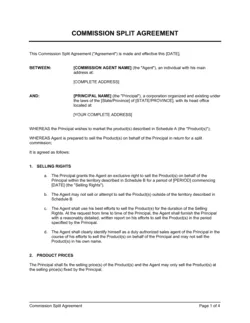
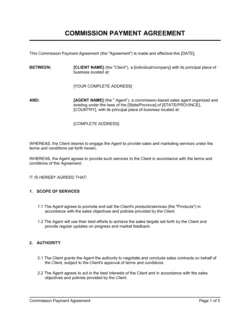
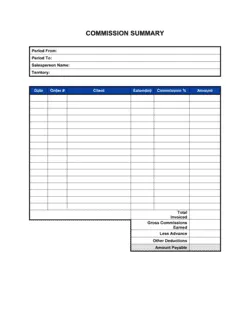
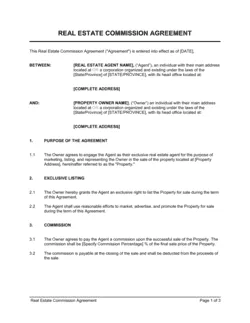
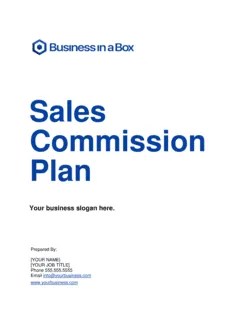
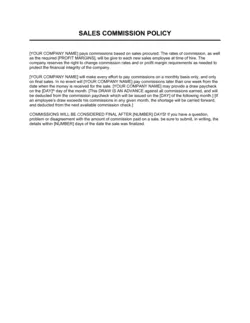
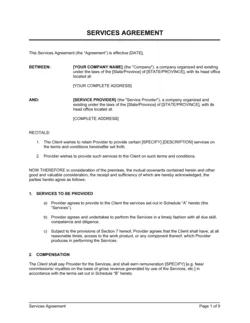
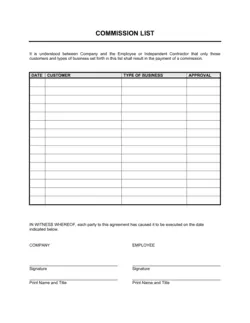
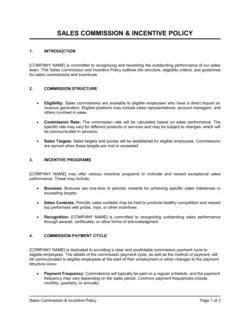
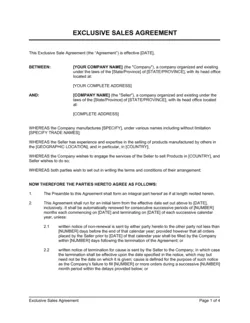
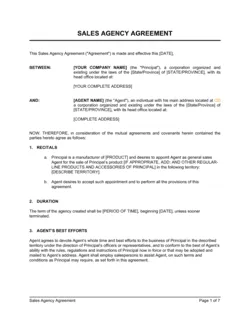
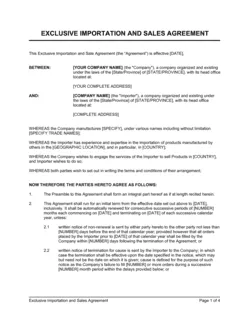
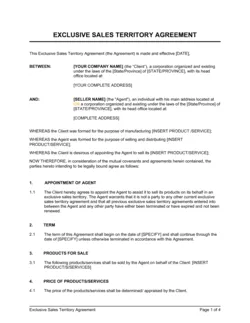
Commission Agreements: A Comprehensive Guide
There are many ways to promote sales in your business, but one of the most productive and profitable is to have a sufficient sales force that delivers outstanding sales. Many companies use salespeople to bring in continual sales, and most of these salespeople are remunerated with commission earnings. The use of a sales commission agreement template to manage sales forces has been a functional part of the business for as long as business models have been around, with excellent sales resulting from effective and transparent sales commission contracts that benefit both salesperson and organization. Drafting these agreements can be complicated as they need to create high rewards for the salespeople and manage the liability and quality control for the business in question.
The administration of these commission agreements could put a strain on your business if they do not contain certain elements that protect your business and sales force alike. With an expertly drafted sales commission agreement template such as this collection of templates from Business-in-a-Box, you will be able to attract excellent salespeople and keep them in your organization for longer. Business-in-a-Box has worked with the best lawyers and sales experts to draft the commission agreement template for your use, so you can be certain of the quality and legitimacy. Some of our most popular commission agreement templates include the commission split agreement template, sales representative agreement template and the referral fee agreement template to name a few.
Why Use Sales Commission Agreements in your Business
The principle of earning a commission from your sales is the driving force behind any sales team. Your sales team does the hard work of going out to the market and promoting your product or service to prospective clients and competing with your competitors in a toe-to-toe, face-to-face battle of wits. As most business owners understand, corporate sales are a challenging career choice. The most effective salespeople can take pressure and keep on delivering the sales figures. But salespeople can also be your business downfall if they are not managed correctly and rightly rewarded for their efforts.
That is why you should have a legally binding and adequately worded sales commission agreement template in place that will facilitate the proper control and guidelines for your sales force. Using a powerful template-driven documentation solution for your sales force will enable you to set earnings thresholds that will not only motivate your sales team but will ensure that your business maintains an excellent profit ratio in any market condition. Whether your sales team is employed or contracted, your commission agreements will form the foundation of the relationship between your business and your sales team. Logic dictates that the better your relationship with your sales team is, the higher the sales productivity will be and higher sustainable profits. Using clear and concise commission agreement templates for your sales team, you are setting the tone for business sustainability and client satisfaction.
There are two main reasons for using commission agreements in your business:
- Promote high volume sales for your Business - A correctly formatted commission agreement will motivate your sales staff to become sales fanatics. With expertly designed commission structures that reward high volume sales, you will consistently set the momentum for your sales staff to deliver higher rates of sales to reach high commission payment thresholds.
- Setting high standards for sales interaction - With clear guidelines for how your sales force should interact with clients, you will create a quality standard that will serve your business and sales team collectively. The legal terminology will guide your team to better service delivery than your competitors and promote customer loyalty. Your business will also be protected against malpractice and liability from any unlawful actions by your sales force.
As the guiding reference, your sales commission agreement will not only govern how your salespeople earn from your business but will also give your business the protection it needs in a cutthroat sales market. The sales industry is likely the most extensive business industry worldwide, and your business needs to guard against unauthorized dissemination of your Intellectual Property and Trade Secrets.
As the face of your business, your sales force is the core contact stream for your clients, and if they do their job right then, your clients will never know the inner workings of your business except for the superior service that your salespeople deliver. However, when the “sales machine” breaks down, you need to have the correct systems and procedures to manage the client’s issues and deal with the internal sales disciplinary concerns.
The difference Between Salespeople and Other Employees
In any business, you have “standard employees,” and salespeople, the differences between these two core types of workers have always created conflict in the business environment. Yet when you have the proper legal employment agreements with each of these groups, you will have eliminated most issues that arise from this situation.
Employees - These are your administration staff and other support functions that form your internal business workings foundation. These workers have set hours and work deliverables for which they receive a set remuneration from your business. These employees also have set bonus structures based on work performance and predetermined parameters. The general employment agreement template used for this group of employees is based on a standard pay rate and does not include sales commission remuneration. The legal aspects of this agreement are also different for employees and businesses alike. Fundamentally, these positions form part of your business’s operational costs and have certain limitations on the levels of remuneration that can be afforded.
Salespeople - The core function is to sell and promote the business products or services to your market. This presents several complex issues regarding remuneration and employment regulations. Generating revenue for the business adds to the company’s overall turnover and the commission structure that most salespeople work under. In their working day, salespeople interact with clients on the necessary levels of spending money with your business. This relationship must be managed from the business point of view as it could negatively impact the business if mismanaged. Their earnings’ variable nature has tax implications for the salesperson and your business and should be addressed in your sales commission agreement. You could also have salespeople employed on varying scales of commission and basic salary packages depending on their specialty or skill set within your organization. The relationship between the commission and necessary must be documented to prevent disputes and labor issues.
Core Structure of Sales Commission Agreement Templates
As mentioned above, you could have several types of sales commission agreements in your organization, and these all require specific language to be legally binding. In all these agreements, you need to allow for any potential sales situations that might present themselves and the earnings - commission rates - that your sales team will earn. The core structure of your sales commission agreements must include the following:
How Commission is Earned - Your sales commission agreement must have specific terms set out on how your sales team earns their commission and when the sales are accredited to the salesperson. This will also be guided by the sales process so that the sales are awarded and credited to the salesperson after specific criteria have been met, i.e., signed purchase orders from the client.
When Commission Payments are Made - Sales commission payments are typically made once the client has made their payment to the business. But in specific environments, that sales cycle is much longer. Your commission agreement must stipulate when the salesperson will get their commission payment after the sales have been made in these situations. Specific industries often make part payments to the salespeople as particular thresholds in the sales cycle are reached.
Cancellations and Refunds - Any revenue lost due to client cancellations or refunds must be reflected in the sales commission agreement, or it might lead to severe consequences for the business. Your business must earn revenue to pay the commission. So, with a legally drafted commission agreement draft, you will have protection against paying commission in the event of client cancellations and refunds. You might also want to create certain thresholds that will protect you and your salespeople in this case, such as a time limit on cancellation and refund penalties.
Commission Calculation - The way you calculate the commission earned by your salespeople must be spelled out precisely to prevent payment disputes and tax implications for both company and commission earner. These calculations are generally set according to a percentage of revenue or gross profit. These calculations should consider the cost of sale and the cost of shipping and delivery to the client. The commission earnings are often only calculated after these operational costs are deducted from the total sale amount. These calculation parameters will also include whether the salesperson is earning a basic salary and its necessary salary expenses.
Commission Bonuses - Bonuses for exceptional sales turnover must also be included in the sales commission agreement to allow for high-performance sales efforts. These bonuses are typically related to exceptionally high net sales and will motivate and reward critical performance in your sales staff. These bonuses could take the form of tiered sales commission percentages or a lump sum bonus once a specific sales target has been reached.
With these aspects of the sales commission agreement fully addressed within your commission sales agreement template, you will be able to structure your sales force effectively for your needs. Business-in-a-Box offers you a host of sales commission agreements that can accommodate any type of sales structure that you deem necessary for your business; providing you with business templates designed by business experts and legal professionals to provide for every type of commission structure that is commonly used in just about every industry. The available structures are:
- Basic Plus Commission - Your sales team earns a basic salary plus a commission percentage that allows for the company’s operational cost. For example, the salary package is a combination of 40% basic salary and 60% commission.
- Commission Only - The salesperson earns a fixed or variable commission rate, i.e., set percentage of sales like 10% of sales turnover.
- Relative Commission - The commission payable is relative to the achievement of sales target, i.e., 80% sales target reached = 80% commission payable.
- Absolute Commission - A fixed commission for each new client the salesperson signs, i.e., $500 per client regardless of turnover.
- Straight Line Commission - A fixed rate of commission relative to their quota, i.e., 75% of sales quota = 75% of the commission.
- Tiered Commission - A tiered percentage of commission based on increasing sales revenue thresholds and often used to motivate salespeople to reach maximum sales numbers in your business.
Just about every business has a sales force. The proper management of this business relationship will benefit your business and your sales staff in terms of remuneration and any legal or tax concerns depending on your jurisdiction. Sign up and get access to more than 2000 business templates that will set your business apart from your competition and will attract better salespeople and more profits.


